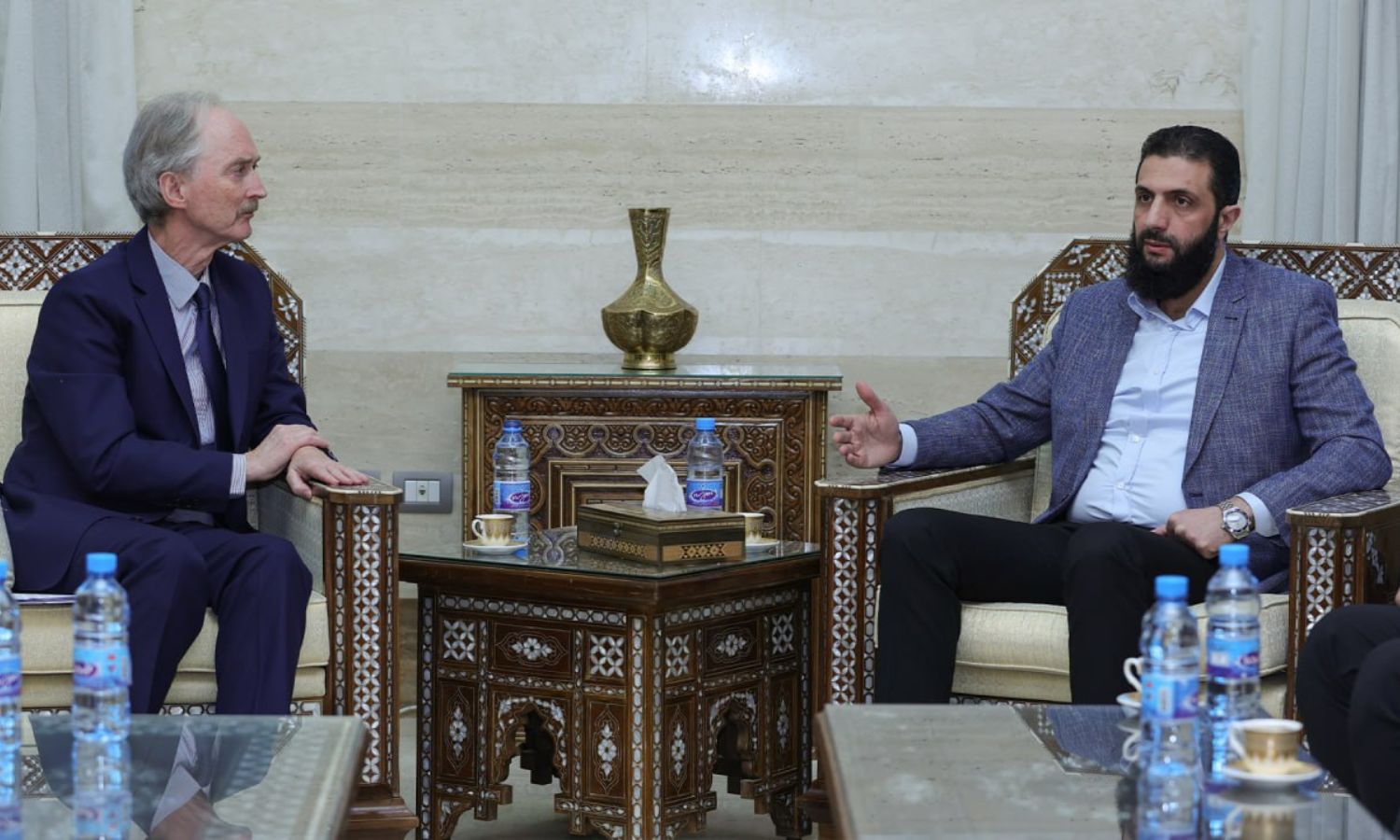



Ahmed al-Sharaa (Abu Mohammad al-Jolani), the commander of the Military Operations Administration, called for updating UN resolution 2254 regarding the political transition in Syria.
The official account of the General Command in Syria published on Sunday, December 15, that al-Sharaa met with the UN envoy to Syria, Geir Pedersen.
The two sides discussed the necessity to reconsider resolution 2254, given the changes that have occurred in the political landscape, considering it essential to update the resolution to align with the new reality.
During his conversation with Pedersen, al-Sharaa emphasized the importance of swift and effective cooperation to address Syrian issues, the necessity to focus on the territorial unity of Syria, reconstruction, and achieving economic development.
He added that it is crucial to deal with caution and precision during the transition phases, and to rehabilitate institutions to build a strong and effective system, highlighting the importance of providing a secure environment for the return of refugees and offering them economic and political support.
On his part, the UN envoy Geir Pedersen made press statements on Sunday regarding new challenges in Syria.
He said, “We need to launch a political process that includes all Syrians, and it is clear that this process must be led by the Syrians themselves; it is a Syrian responsibility, and we hope they receive assistance.”
Pedersen added, “We all know that Syria has gone through a tremendous humanitarian crisis, so we must ensure that Syria receives more immediate humanitarian assistance for the Syrian people and for all refugees who wish to return,” considering that the whole issue relates to economic recovery, which requires a swift solution to this problem.
Pedersen’s visit to Syria came after his participation in the Arab Liaison Committee meeting regarding Syria in Aqaba, Jordan, which included foreign ministers from Jordan, Saudi Arabia, Iraq, Lebanon, Egypt, and the Secretary-General of the Arab League, as well as foreign ministers from the United States, Turkey, the UAE, Bahrain, Qatar, the French Minister of Europe and Foreign Affairs, and representatives from Britain and Germany and the High Representative for Foreign Affairs and Security Policy.
The Aqaba meeting concluded by emphasizing support for a peaceful, political, Syrian-Syrian transitional process that includes all Syrian political and social forces, including women, youth, and civil society, fairly, and is sponsored by the UN and the Arab League, according to the principles, objectives, and mechanisms of Security Council resolution 2254.
The Arab Liaison Committee supports, under the Security Council resolution, the formation of an inclusive transitional governing body through Syrian consensus (the regime’s government – the opposition government – representatives of civil society) and the initiation of the steps outlined by the resolution to transition from the transitional phase to a new political system that meets the aspirations of the Syrian people in all its components, through free and fair elections overseen by the UN, based on a new constitution approved by the Syrians, and within specific timelines according to the mechanisms adopted by the resolution.
Hours after the Aqaba statement, which adhered to the UN resolution 2254, the opposition’s Syrian National Coalition welcomed the outcomes of the statement and the meeting of the Liaison Committee.
The Coalition considered that what was mentioned in the statement expresses “genuine and significant support for the aspirations of the Syrian people” regarding supporting a peaceful, political, Syrian-Syrian transitional process that fairly represents all Syrian political and social forces, including women, youth, and civil society, under the auspices of the UN and the Arab League, according to resolution 2254.
The UN resolution, in its content, calls for the formation of an inclusive transitional governing body through Syrian consensus (the regime’s government – the opposition government – parties from civil society) and the initiation of the steps outlined by the resolution to transition from the transitional phase to a new political system that meets the aspirations of the Syrian people in all its components, through free and fair elections overseen by the UN.
The Coalition also stated that elections should be conducted based on a new constitution approved by the Syrians, within a specified timeline according to the mechanisms adopted by resolution 2254.
The General Command did not comment on the Coalition’s statement or the Aqaba statement, but activists launched an online campaign under the slogan “The Aqaba statement does not represent us,” considering it imposes guardianship over the Syrians.
Many Syrian politicians also objected to the manner in which the Liaison Committee meeting was held, as the Syrian opposition politician Burhan Ghalioun stated that holding the Liaison Committee meeting on Syria in Aqaba, Jordan, with the presence of many countries that did not hide their support for the ousted Bashar al-Assad regime instead of holding it in “free” Damascus with the participation of Syrians bodes ill and does not reassure about the intentions of the committee.
He added that this mechanism implies a desire to impose guardianship and appears as a “conspiracy much more than a wish to express solidarity and provide support for the Syrians.”
On his part, the head of the Syrian Negotiation Commission, Badr Jamous, which is an opposition body concerned with conducting negotiations with the regime, said that the Commission’s position is clear and steadfast in the necessity of proceeding at this time to ensure the achievement of the goals of the Syrian revolution and the establishment of a civil democratic state that grants the people the right to select their representatives without intimidation or fear, in a safe and neutral environment.
The Commission believes that the items mentioned in resolution 2254 represent a genuine means to achieve that, and that the absence of the ousted regime does not nullify this resolution, especially since the parties have not yet reached the objectives that were defined and built upon.
if you think the article contain wrong information or you have additional details Send Correction